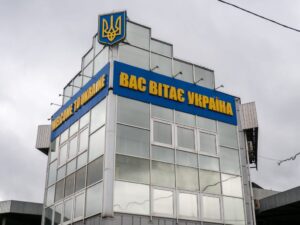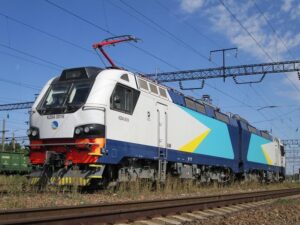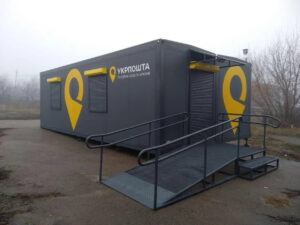
The European Union may provide Ukraine with a grant to modernize the Shepit-Izvoarele Sucevei border crossing point on the border with Romania as part of the Interreg VI-A NEXT Romania-Ukraine 2021-2027 program, according to the press service of the Recovery Agency. According to the report, the program’s governing body has approved the selection of the BOND – Border Operations and National Development project. The project has been recommended for funding and may receive a grant of up to €690,900, which is 90% of the total project budget.
The Recovery Agency noted that BOND is the next stage of comprehensive work on opening the Shepit-Izvoarele Sucevei border crossing point, provided for by an intergovernmental agreement between Ukraine and Romania. Earlier, as part of the Romania-Ukraine 2014-2020 program, mirror infrastructure projects were implemented on both sides of the border – bridges and access roads were built, and flood protection measures were carried out on a 2 km section on the Ukrainian side and a 3 km section on the Romanian side.
As specified, the BOND project provides for the technical equipment of the checkpoint on both sides of the border, in particular the purchase and installation of specialized equipment for the safe and efficient operation of the checkpoint, as well as the development of a joint cross-border strategy for the development of border areas.
The Interreg NEXT “Romania-Ukraine” program for the period 2021-2027 is aimed at supporting cross-border cooperation and covers the border counties of Romania and the Zakarpattia, Ivano-Frankivsk, Chernivtsi, and Odesa regions of Ukraine.
BORDER, CHECKPOINT, EUROPEAN UNION, GRANT, MODERNIZATION, ROMANIA

The Ministry of Economy, Ecology, and Agriculture of Ukraine will resume accepting applications for grants for the development of horticulture, berry growing, viticulture, and greenhouse farming on February 2, 2026. Documents will be submitted through the Diya portal. The total budget for the program in 2026 is $465 million, according to the ministry’s press service.
“We are resuming one of the important programs to support farmers — grants for orchards and greenhouses. This is not short-term assistance, but an investment in the development of the agricultural sector, the creation of jobs in communities, and the improvement of production sustainability. (…) Our goal is to support producers, stimulate the creation of value-added products, and ensure the sustainable development of rural areas, especially in the context of war and post-war recovery,” emphasized Taras Vysotsky, Deputy Minister of Economy, Environment, and Agriculture.
The Ministry of Economy specified that grants for orchards will be available for planting and developing plantations ranging from 1 to 25 hectares. The maximum amount of support is up to UAH 10 million per recipient, but no more than UAH 400,000 per hectare. Grants for greenhouses are provided for the construction of modular greenhouses with an area of 0.4 to 2.4 hectares. The size of the grant will depend on the area: 0.4-0.6 hectares – up to UAH 2 million, 0.8-1.2 hectares – up to UAH 3.5 million, 1.6-2.4 hectares – up to UAH 7 million.
For projects in frontline and deoccupied territories, the state may cover up to 80% of the project cost. The project must be implemented on land whose ownership or use rights have been confirmed for at least seven years.

The fleet of electric locomotives of JSC Ukrzaliznytsia is five times larger than the fleet of diesel locomotives, which makes them critically important and necessitates the purchase of electric locomotives, said the company’s CEO Oleksandr Pertsovskyi in a comment to journalists in connection with the purchase of 55 electric locomotives from French manufacturer Alstom.
“The basis of Ukrainian logistics, Ukrainian railways, as well as European railways, is electric traction. It is more efficient, it accounts for 80% of our volume, it is five times more than their fleet, and there is a critical need in this segment,” Pertsovsky emphasized, according to an Interfax-Ukraine correspondent.
According to him, the ratio of electrified and non-electrified networks of Ukrainian Railways is “about 50-50,” but 80% of cargo and passenger traffic passes through electrified sections.
Pertsovsky clarified that the cost of electric traction transportation is 4-5 times lower.
“It is absolutely critical for us to have a reliable fleet of electric locomotives in order to transport our cargo economically,” the head of the UZ board concluded.
It is noted that at the beginning of the project, the possibility of purchasing diesel locomotives was considered, but the international community and Ukraine, as part of it, decided to adhere to the principles of the Paris Declaration, avoiding new capital investments with a high environmental impact.
The chairman of the board acknowledged that in the current conditions, when there are risks of power outages, diesel locomotives are relevant, but for this purpose, the company is urgently restoring the diesel locomotives that it inherited in large numbers.
Separately, Pertsovsky reported that a group of engineers and machinists visited Azerbaijan, where similar locomotives from the French concern Alstom are in operation, to familiarize themselves with their operation and technical features.
As reported, the French company Alstom and Ukraine’s Ukrzaliznytsia signed a contract to supply 55 electric locomotives to Ukraine worth EUR473 million in 2027-2029. The first electric locomotive will arrive in Ukraine in the first quarter of 2027. This will be followed by certification and the necessary tests.
Ukrzaliznytsia emphasized that 37% of the project’s funding is non-repayable grant aid of approximately EUR 173 million from the URTF fund managed by the World Bank, while the rest is a preferential long-term loan from the EBRD for EUR 300 million.

From October 28 to November 17, 2025, grape growers and winemakers in the Odessa region can apply for grants from the Food and Agriculture Organization of the United Nations (FAO) in cooperation with the Ministry of Economy, Environment and Agriculture of Ukraine, with financial support from the Italian government.
According to information on the Ministry of Economy website, winegrowers and winemakers registered in the State Agrarian Register (SAR) who cultivate between 0.5 and 20 hectares of vineyards in the Odessa region are eligible to participate in the program.
Selected participants will be able to receive grant support ranging from $10,000 to $25,000. The amount will depend on production volumes and justified needs.
The new FAO program aims to develop Ukraine’s wine sector by expanding access to modern equipment, quality planting material, and technical support, as well as introducing market-oriented approaches that will ensure the sustainable development of small producers.
According to Shakhnoza Muminova, head of the FAO Office in Ukraine, quoted in the ministry’s publication, the initiative is a step in the long-term cooperation with the Ukrainian government to strengthen the rural economy and restore value chains in the agri-food sector.
The program also provides for technical support, training, and consulting, as well as assistance in implementing a system of protected geographical indications to increase the competitiveness of Ukrainian wines in domestic and foreign markets.

Ukrzaliznytsia (UZ), subject to European and state co-financing, plans to implement the Mostytska-Sknyliv project in the next two years and further develop the Lviv-Uzhhorod -Chop and Lviv-Chernivtsi-Vadul-Siret (Romania), which will allow Ukraine to begin restoring and realizing its unique geographical status, said Oleg Yakovenko, director of the strategy and transformation department at Ukrzaliznytsia.
“We also plan to obtain grant funds for the Mostyska-Sknyliv project, which will connect 80 km of European gauge track between the Polish border and Lviv. Next, we are currently conducting technical and economic studies on the corridors connecting Lviv, Chernivtsi, and Romania,” Yakovenko said during the Kyiv International Economic Forum (KIEF) on Thursday, October 16.
According to him, as part of Ukraine’s integration into the European Union, UZ plans to develop 1435 mm gauge railways and European transport corridors on the territory of Ukraine. The European integration reform of the railway industry also envisages a radical change in the functioning of the entire railway model in Ukraine.
“First of all, we are talking about market reform, which involves separating the infrastructure operator within Ukrzaliznytsia from the transport operators. This will allow us to liberalize the market in the future. It will also allow us to create market mechanisms specifically for transport,” Yakovenko explained.
He named the introduction of European rules on technical compatibility and interoperability as another element of the reform. This concerns technical safety standards, as well as changes to the safety management system.
The director of the strategy and transformation department at Ukrzaliznytsia noted that a draft law “On the safety and interoperability of Ukraine’s rail transport” is currently planned to be submitted for adoption by the end of the year, while next year the company expects a law on market liberalization to be introduced.
As Yakovenko explained, it is expected that a so-called infrastructure access tariff will be formed, according to which market participants will be able to purchase certain access to transport routes from the infrastructure operator on a competitive basis.
“These tariffs will be regulated, i.e., they will be formed in accordance with the tariff formation procedure and will reflect economically justified tariffs in accordance with European rules,” emphasized the representative of Ukrzaliznytsia.
It is noted that the new system will introduce separate PSO (Public Service Obligation) contracts between passenger carriers and the state at the national level, as well as between carriers and local authorities. This should remove the financial burden from freight transport.
As reported, in September, a section of standard (“European”) 1435 mm gauge railway was opened between Uzhhorod and Chop in Zakarpattia Oblast, which will allow for direct rail connections between Uzhhorod and a number of European capitals.
In addition, in January 2025, it was reported that the reconstruction of the railway track on the section “Polish State Border – Mostyska II – Sknyliv (Lviv)” would be postponed until 2026, although in February 2024, the then Deputy Prime Minister for Recovery – Minister of Community, Territory and Infrastructure Development Oleksandr Kubrakov announced the start of construction by the end of 2024. Later it became known that Ukraine had failed to attract Connecting Europe Facility (CEF) funding for the project. It was reported that the US Agency for International Development (USAID) was considering financing 50% of the project’s cost, but it has since been liquidated.
CONSTRUCTION, EU, European gauge, GRANT, LVIV, UKRZALIZNYTSIA

Ukrposhta JSC will receive EUR600 thousand for the installation of modular branches from the European Bank for Reconstruction and Development’s (EBRD) Special Crisis Response Fund, the company’s press service said.
According to the company’s announcement on Tuesday, the grant was provided in support of a EUR63 million loan already granted to Ukrposhta by the EBRD.
The company emphasized that the modular branches can be quickly installed in place of stationary branches that have been destroyed or damaged by enemy shelling.
“Modular offices will also be installed in settlements “cut off from the world” – with barrier-free access, equipped with Starlink and generators, they will become an island of stability for Ukrainians,” Ukrposhta said in a statement.
In addition, it is reported that in the modular branches it is possible to send a parcel within Ukraine and abroad; pick up ordered medicines; make a transfer or pick up funds sent by loved ones; subscribe to publications; pay utility and other bills; receive a pension.
The donors of the EBRD Special Crisis Response Fund are Canada, Denmark, France, Germany, Italy, Japan, the Netherlands, Norway, the Republic of Korea, Switzerland, the United Kingdom and the United States.